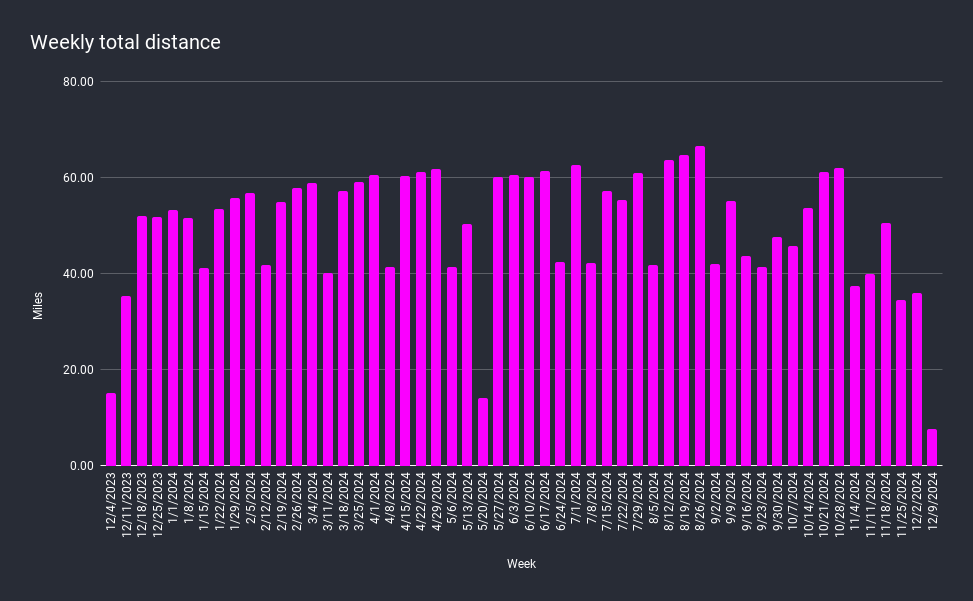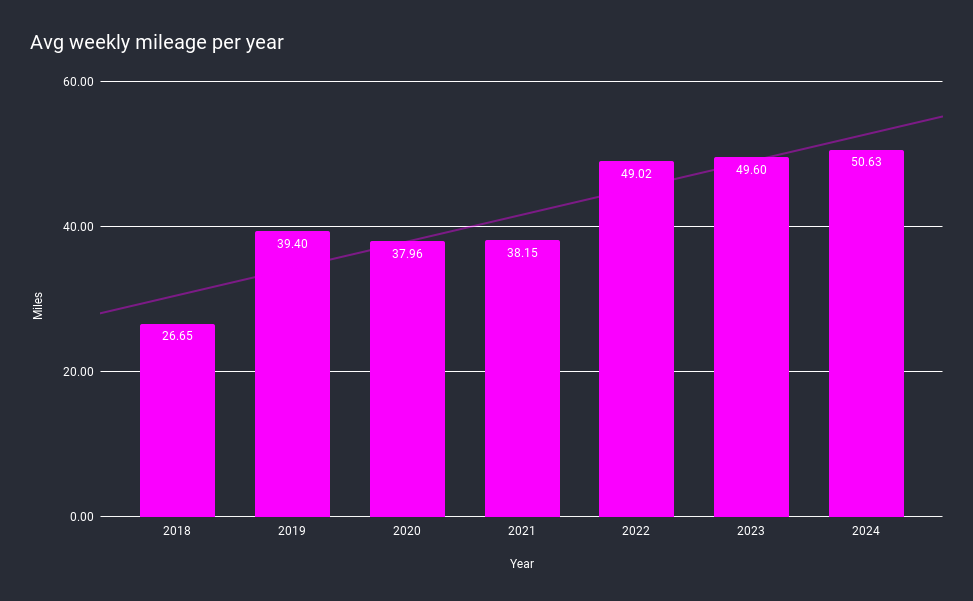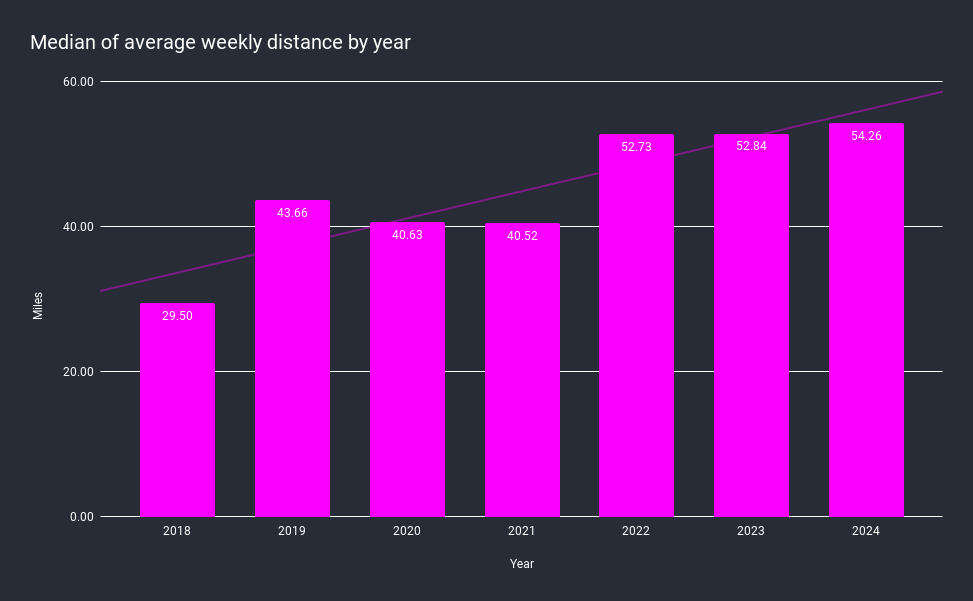CIM 2024 Post Mortem
I am not better than anyone.
I had a terrible race at this year's California International Marathon. Taking a page from Meb Keflezighi's 26 Marathons and common racing wisdom, I entered the race three goals:
- C goal: Get a post-kid PR and break 3:30
- B goal: Break 3:25
- A goal: Break 3:24:33 (pr from 2015)
Based on race performances from September and October I felt that I was sure to hit my C goal unless something went wrong.
Something did go wrong and I ended up finishing at 3:54:22 chip time. Not my worst marathon, but given my expectations going in, my worst marathon.
I ran the first half at 1:45:35, which was 13 seconds faster than my CIM performance last year. That still put me in credible range of my C goal. But the second half I positive split with a 2:08:47.
The question I'm left with is, what happened? Much like a commercial airline crash, it was probably the combination of many little mistakes and circumstances that caused a catastrophic disaster.
My training and fitness peak did not line up with the marathon. I was probably in my best shape in September and October. Race recovery disrupts training. I might have lost some fitness in November due to illness (stomach bug). My volume declined and not just because of my taper. Due to racing, I got away from my 3 up 1 down week pattern. I fixated on hitting certain arbitrary weekly mileage markers. To mitigate this, we'll either have to change when we race or modify training to better line up with racing.

Also the week of Thanksgiving my throat hurt enough for me to get a strep test, which was negative. But I've been slightly congested since then. I'm fairly certain this had some impact on my running. It's hard to avoid sickness altogether, but over training will exacerbate one's risk.
I used a new heart rate monitor for the race. My normal Garmin monitor disintegrated while I was changing the battery and so I had to make a last minute purchase of a new Wahoo monitor. It could be that the new monitor read a lower HR than my previous monitor, which led me to falsely believe I was running a sustainable effort for the first half of the race. Seems dubious.
Another culprit is diet and weight. I'm definitely low on protein intake especially considering my mileage and weight lifting. I'm also probably carrying around 5-10 pounds more than is strictly optimal. Macro-tracking is a knob I may decide to futz with this coming year.
Often these races can turn south because of a failure to hydrate or properly consume nutrition before and during the race. That was not my problem. I actually stuck with my nutrition plan and carried a water bottle for the first half of the race so I could take frequent small sips. This worked pretty well for me.
New for me this year is weight lifting. Squats, lunges, benching, and the rest probably impact shorter races more than longer races, and that bears out in my 5k, 10k, and 15k performances this year. I thought this additional exercise would help in the final miles of the marathon by slowing the accumulation of wear and tear that manifest in the last 10k of a marathon. That was not my experience, however.
It is also likely that I need to adjust my weekly load. In 2024 I averaged almost 51 miles per week. The previous two years, with stronger CIM performances, I averaged 49-50 miles per week. In other words, for the past three years my average weekly milages has been very consistent. But, 2024 I introduced weight lifting twice a week. While the additional load does not show up in the graph, it does show up on my body. More than likely I was over-training. Over training leads to injury and can degrade the immune system.

Looking at the median of my average weekly distance hints at an even larger load increase this year. Median is useful because it eliminates some of the more aberrant weeks resulting from racing, illness, and other circumstances.

If I typically run something like 55 miles per week adding in weight training I could be experiencing something more akin to 65 or 75 miles of load per week. I have not made a 10 mile load increase since 2022. It could be that the load was just too much too soon.
I under perform in marathons compared to what my shorter races predict. My October 15k time of 1:07:29 predicts a 3:22:13 marathon, which does not take into account elevation. Next year it makes sense to use a half marathon as a dipstick race because the performance at that distance is probably more predictive. I may just be one of those sad runners who is better suited for shorter distances, but has nonetheless fallen in love with the marathon.
I try to limit how much Strava stalking I do, particularly after a performance like this. But when I do look, I notice that I typically run a lot more than the people finish the marathon with. That is not a great feeling.
The real question is, what have I learned? Marathons are great teachers and a bad marathon is a humbling experience. I've learned that I'm not special and things will not just go my way. I'm not better than marathoners who run less than me - many hundreds of them beat me in this race.
I'm not sure what my next race will be.
I will continue weight lifting. I will likely decrease mileage to accommodate this additional load. I might start out with a target of 50 miles per week plus weight lifting. I'll key into my recovery paces. If I'm recovering at 10:30 minutes per mile, I'm probably over training.
I will try to be less fixated on long run distance and focus more on time. Two and a half hours is plenty, but it also probably means 16 miles or less. This year I was very concerned about getting as many 18 and 20 mile runs as possible and this seems to not have moved the needle at all. A lot of these runs were at 10-11 minute mile paces, which with hindsight seems counter productive.
I need to make sure I run my workouts at the right pace and it is okay to leave more than a little on the table. My 400m repeats should not be faster that 7:00 per mile pace. My 800m repeats should not be faster than 7:15. My marathon effort paces should not be faster than 8:15. Next time I race, we can adjust these numbers accordingly.
I'd be lying if I said I am giving up on breaking my marathon PR. I think it's possible, but only with a significant improvement to my training, diet, and sleep. But I am not only running for a marathon record that will have eluded me for a decade at this point. I'm also running for my health and wellbeing. I'm going to make sure that this year I'm optimizing for those two points especially and then perhaps the PR will come.
CIM 2024 was my fifteenth marathon and I feel as uncertain about my training as ever. Everything I've just written could be wrong.
Member discussion